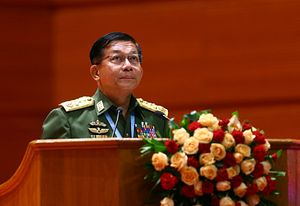On August 2, 2017, a plane carrying Myanmar’s commander-in-chief, Senior General Min Aung Hlaing, touched down in Tokyo.
He was leading a delegation of senior military officials who had come to meet with their counterparts in the Japan Self-Defense Forces, along with a Japanese grant-making organization. Cooperation was discussed; dinner was shared; gifts were exchanged.
Just over three weeks later, on August 25, forces under Min Aung Hlaing’s command launched a widespread, systematic, and bloody assault on hundreds of Rohingya villages in the wake of a series of attacks on security posts by a Rohingya armed group, the Arakan Rohingya Salvation Army (ARSA).
In the initial days of the violence, and again in late September when announcing emergency humanitarian assistance to affected communities in Rakhine state, Japan’s Ministry of Foreign Affairs condemned the ARSA attacks, but appeared to give Myanmar’s security forces a free pass.
Within several months, the military’s targeted, horrific violence prompted more than 725,000 Rohingya women, men, and children to flee to neighboring Bangladesh. The sudden exodus was Southeast Asia’s largest mass displacement of people in decades. A year later, those who fled remain in limbo in the world’s largest refugee camp.
Amnesty International has documented in great detail the Myanmar military’s atrocities against the Rohingya, which included targeted burning of villages, forced starvation, the use of landmines and the commission of crimes against humanity including murder, rape, torture, and deportation of the Rohingya population. After the initial violence subsided and Rohingya homes lay burnt and abandoned, Myanmar authorities began bulldozing Rohingya villages and building new security force bases in their place. They also maintain a dehumanizing system of apartheid against the remaining Rohingya in Rakhine state.
Amnesty International’s research has implicated specific military units in atrocities. They include the 33rd and 99th Light Infantry Divisions (LID), combat units in the Myanmar Army that were deployed to northern Rakhine state in mid-August 2017 and executed hundreds of Rohingya in the villages of Chut Pyin and Min Gyi later that month.
These units have a history of abuse. In late 2016 and early 2017 they committed war crimes in Kachin and northern Shan state, where reports of human rights violations against ethnic minority civilians continue to this day.
Based on extensive evidence gathered over nine months of research, including in Rakhine state and the refugee camps in southern Bangladesh, Amnesty International identified and named 13 individuals who should be criminally investigated for crimes against humanity. Among them is Senior General Min Aung Hlaing.
Yet, even as evidence of the Myanmar military’s crimes mounted and senior UN officials denounced it as ethnic cleansing, Japan’s government did not join the global outcry or attempt to distance itself from Myanmar’s military leadership.
In a meeting with Min Aung Hlaing in Naypyitaw in November 2017, Japan’s State Minister for Foreign Affairs Kazuyuki Nakane referenced “alleged … human rights abuses” in northern Rakhine state, but did not criticize the Myanmar military’s actions. Instead, he reaffirmed the two countries’ strong military ties.
Beyond its military-to-military cooperation, Japan has a significant role in Myanmar’s affairs. In January this year, the government announced an additional $20 million in humanitarian aid and development assistance for Rakhine state. As a major donor, Japan has a duty to ensure it does not contribute to the ongoing commission of crimes under international law, including crimes against humanity and war crimes in the country.
Then came Japan’s decision – with nine other states – to abstain from voting when the UN Human Rights Council adopted a resolution in March 2018 to “strongly condemn the reported widespread, systematic and gross human rights violations and abuses committed in Rakhine State.”
Japan’s official statements – or silence – on what has happened in Rakhine matter.
It was therefore disturbing/astonishing that – just one day after the UN issued a blistering report calling for senior military officials to be prosecuted for genocide, crimes against humanity, and war crimes – Japan’s ambassador to Myanmar met with Senior General Min Aung Hlaing to discuss bilateral relations and “promoting friendship between the two armed forces.”
This show of support should perhaps come as no surprise. Several weeks earlier, when Foreign Minister Taro Kono visited Min Aung Hlaing, the general greeted him and Japan as a “friend,” and again declined to condemn the ethnic cleansing. Instead, he expressed support for a national “Independent Commission of Enquiry” into the situation in Rakhine state – which includes a former Japanese Ambassador.
But there is scant hope that this enquiry will deliver justice. The Myanmar authorities cannot be trusted to investigate adequately the appalling crimes against the Rohingya. Previous investigations have lacked independence, impartiality, and competence, and victims and witnesses were harassed and intimidated. There is no indication that this latest body will be no different.
It is time for the international community to step in, and Japan needs to be a part of this effort.
When the UN Human Rights Council and General Assembly convene in the coming weeks, strong, decisive action is needed to pave the way for justice for the Rohingya and for ethnic minorities under attack in northern Myanmar.
Amnesty International is calling on Japan and all states to push for justice, truth, and reparation by establishing an independent mechanism to gather and preserve evidence of crimes under international law, as well as for the UN Security Council to urgently refer the situation in Myanmar to the Prosecutor of the International Criminal Court.
Japan should unequivocally condemn the Myanmar military’s crimes against the Rohingya and other ethnic minorities, and press for those suspected of criminal responsibility to be brought to justice in fair trials. Unless it ends its silence about the appalling crimes in Myanmar’s northern Rakhine state, Japan will be left on the wrong side of history.
Lisa Tassi is Amnesty International’s Deputy East Asia Director.

































